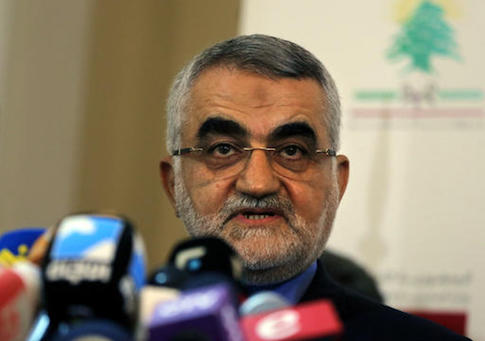Senior Iranian officials are warning the Trump administration about disclosing secret deals related to the nuclear deal that have long been hidden from the public by the Obama administration, according to recent comments that prompted pushback from senior sources on Capitol Hill.
Iran's warning comes on the heels of a Washington Free Beacon report disclosing that former national security adviser Michael Flynn had been pushed out of office partly due to his intention to release these sensitive documents to the American public.
Leading lawmakers in Congress launched multiple investigations last year into the Obama administration's efforts to keep these documents secret and out of public view. Sources who spoke to the Free Beacon about the matter said that the Trump White House is working on ways to publicize this information despite warnings from Iran.
Secret side deals related to the nuclear agreement remain unclassified but have been stashed in a secure location on Capitol Hill, making it difficult for staffers and lawmakers to view them. Individuals seeking to view these documents must have security clearance and are barred from taking notes or speaking about what they see.
Multiple senior congressional sources familiar with the nature of the documents told the Free Beacon that lawmakers and the Trump administration would not be intimidated by Iranian threats.
Alaeddin Boroujerdi, a senior Iranian lawmaker and head of country's foreign policy committee, warned the Trump administration against making these documents public in recent remarks.
"If Trump wants to publish confidential documents exchanged between Iran and the International Atomic Energy Agency, it will in fact constitute a violation of the agency's obligations, because the agency has been committed not to make Iran's confidential nuclear information and documents available to any country, including the U.S.," Boroujerdi was quoted as saying in Iran's state-run media.
Some of these documents surround side deals struck between Iran and the IAEA regarding the Islamic Republic's ability to enrich uranium. They also include deals about how much information Iran must disclose to international inspectors about the country's contested nuclear program.
As part of the nuclear deal, U.S. inspectors are not permitted to take part in the review of any Iranian sites.
Rep. Peter Roskam (R., Ill.), a vocal opponent of the Iran deal who has long been fighting for the full disclosure of the Iran deal documents, told the Free Beacon that the Obama administration hid these documents in order to mislead Americans about the true nature of the agreement.
"The administration is under no obligation to conceal information about secret side deals, nor should they feel obligated to protect the anonymity of individuals or institutions who misbehaved at the behest of the Obama administration," Roskam said.
Included in these documents are details of multiple, secret payments to Iran that totaled close to $2 billion. The money is believed to have been part of an incentive package aimed at securing the release last year of several American hostages in Iran.
None of this information is technically classified, yet it remains hidden from the American public and a large portion of Congress.
"The deal has only survived this long because the Obama administration gave Iran secret exemptions to cheat," said one veteran congressional adviser familiar with the documents. "The Iranians know that if people found out about those exemptions, it would be obvious that the deal was always a bad, unsustainable deal, and they couldn't blame Trump. That's why they're making up reasons why parts of the deal should be kept secret."
Iran is expressing opposition to the disclosure of the information in order to force the Trump administration into a corner, the source maintained.
A senior congressional aide familiar with the situation further told the Free Beacon that U.S. lawmakers would not be instructed by Iran about what can and cannot be made public.
"Our declassification procedures are not subject to the whims of Iranian officials," the source said. "Unclassified documents should be released so the American public can see just how bad of a deal the previous administration negotiated on its behalf."
A second congressional source explained that federal law mandates these documents be released to lawmakers. This includes side deals and other materials related to the future of Iran's nuclear program.
"The American public has a right to know what's really going on behind the scenes with the nuclear agreement. At the very least, Congress is entitled to all relevant documents—including side arrangements or any other related materials—as mandated by federal law under Corker-Cardin," the source said. "We won't be intimidated by these empty threats from Iran or any international body. It's time to make these secret documents public so everyone can for themselves what this deal is really all about."
